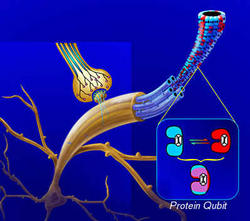| Brain does quantum computing | 2002-11-30 01:42 2 comments |
 by Flemming Funch by Flemming FunchMost scientists who have studied brains and tried to figure out what consciousness is have started with the assumption that a brain is some kind of computer and that consciousness is is a new property that emerges from complex computation. I personally think that's a very silly assumption to make. But there is traditionally a huge split between the people who think that consciousness is some peculiar by-product of a fundamentally material universe, versus the people who think that consciousness exists eternally and the material universe is a temporary structure that it is manifested in. Oh and maybe a third category of people who think that some external deity made the whole thing, and it is none of our business to mess with it. Anyway, some of these camps might come closer together if it can become more clear what brains are really doing and what they have to do with consciousness. Stuart Hameroff at the University of Arizona Center for Consciousness Studies has a theory of quantum consciousness. Together with Sir Roger Penrose he has developed a model of quantum computation in brain microtubules. "Neurons may be far more complicated than mere switches. If we look inside neurons and other cells, we see highly ordered networks (the 'cytoskeleton') comprised of microtubules and other filamentous structures which organize cellular activities.. Microtubules are cylindrical polymers of the protein tubulin arranged in hexagonal lattices comprising the cylinder wall. Cooperative interactions among tubulin subunits within microtubules have been suggested to process information, as in molecular scale 'cellular automata'. As the states of tubulin are controlled by quantum mechanical internal forces (van der Waals London forces), they may exist in quantum superposition of multiple states ('quantum bits', or 'qubits'), and microtubules may be seen as quantum computers involved in cellular organization."As he says, the theory has met intense criticism from scientific, computational and philosophical establishments. No big wonder. And whether it works exactly like that, I have no way of judging. But intuitively it makes a lot of sense if a brain is a quantum computer that potentially might function as a lens that can be tuned into many different realities. Makes a lot more sense to me than that it would be some kind of big ROM chip. Memory chips don't forget things and then remember them again later. |